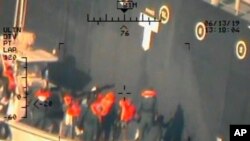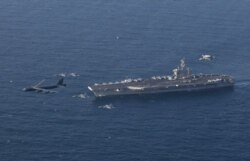Carla Babb and Nike Ching contributed to this report.
Top U.S. military and diplomatic officials warn they have no intention of easing their ‘maximum pressure’ campaign against Iran even as evidence suggests the regime in Tehran is “lashing out” in increasingly dangerous ways.
But despite the rapidly rising tensions in the Middle East, U.S. officials also caution they are not looking to start a war, though much will depend on what Tehran does next.
“We have been engaged in many messages, even this moment right here, communicating to Iran that we are there to deter aggression,” U.S. Secretary of State Mike Pompeo told reporters Tuesday while visiting with military brass at U.S. Central Command in Tampa, Florida.
“President [Donald] Trump does not want war and we will continue to communicate that message while doing the things that are necessary to protect American interests in the region,” he added. “We can't do that without making sure that we have the capability to respond if Iran makes a bad decision.”
Concern about a potential confrontation between the United States and Iran has been growing since U.S. officials last week accused Iran of being responsible for mine attacks on two oil tankers in the Strait of Hormuz.
In addition, the U.S. said intelligence over the past month and a half has pointed to what one top defense official described as “threat streams” coming out of the Middle East that “link back to the Iranian regime.”
U.S. military officials continue to insist all evidence in the attacks on the Norwegian and Japanese oil tankers point to Iran.
"Getting alongside a vessel under the cover of darkness to attach a mine, underway, is not an insignificant effort," the Vice Chairman of the Joint Chiefs of Staff, Gen. Paul Selva told reporters during an appearance in Washington earlier Tuesday.
"It wasn't done by an untrained, unsophisticated group of people. It was done by a military trained and capable force," he added. "The fact that they were able to quickly and safely remove a mine from a side of a ship would indicate it was of their own design."
The Pentagon late Monday released photos alleging to show Iran’s Revolutionary Guards removing an unexploded limpet mine from the Japanese-owned tanker. But some have raised doubts the photos and video show conclusive evidence to tie Tehran to the attacks.
“It’s real tension,” Selva countered. "Iran is lashing out.”
"The risks of miscalculation are real,” he said, adding Tehran was trying to send a “very powerful signal” to the international community over its displeasure with U.S. sanctions aimed at curbing the country’s nuclear program and sponsorship of terrorism.
“The relief to that pressure is the Iranians come to the table [to negotiate]," Selva added.
Beyond the carefully crafted public messages, the U.S. said it has also reached out to Tehran through Iraqi intermediaries and via the Swiss embassy in Tehran.
“We want them to be clear eyed in whatever it is they are planning," Selva said. "If they directly engage U.S. forces or they directly engage U.S. interests or citizens in the region...we will respond."
Iran has denied any involvement on the attacks against the oil takers but announced Monday it would cease complying with the global agreement that prevents it from making nuclear weapons.
In response, the U.S. announced it would deploy another 1,000 troops to help protect U.S. forces in Iraq and Syria that are currently helping in the effort to wipe out remnants of the Islamic State terror group.
A U.S. defense official said the troops were being deployed in an “expedited” manner and would be in place soon.
Multiple officials have said the new troops will bring with them enhanced surveillance and reconnaissance capabilities, using both manned aircraft and drones.
Yet even as military officials admitted the danger of confrontation was mounting, President Donald Trump sought to ease some of the tension.
In an interview with Time magazine on Monday, Trump downplayed concerns over the alleged Iranian attacks on the Norwegian and Japanese oil tankers.
“So far, it’s been very minor,” the president said, casting doubt over the likelihood the U.S. would go to war over such provocations.
“I would certainly go over nuclear weapons,” Trump said when asked what could precipitate war with Iran, “and I would keep the other a question mark.”
Meanwhile, German Chancellor Angela Merkel on Tuesday urged a peaceful solution to tensions in the Persian Gulf, while also delivering a stern warning to Iran.
Speaking in Berlin, Merkel said there is "strong evidence" that Tehran was behind the tanker attacks, and she also warned Iran of the consequences if violates the 2015 international nuclear deal.
A day earlier, Iranian President Hassan Rouhani said on state television that Tehran does not seek conflict and that U.S. efforts to isolate his country have failed.
"Iran will not wage war against any nation," Rouhani said Monday. "Despite all of the Americans' efforts in the region and their desire to cut off our ties with all of the world and their desire to keep Iran secluded, they have been unsuccessful."





